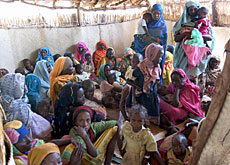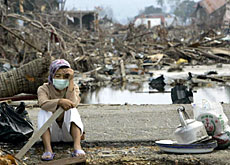Governments asked to fulfil aid promises

More than 250 officials and aid experts are meeting in Geneva to discuss how to make good on their promises of help for millions of tsunami survivors.
The United Nations emergency relief coordinator, Jan Egeland, has opened Tuesday’s conference, which aims to come up with a coordinated relief response to the disaster.
According to the United Nations, as many as five million people are in need of basic services throughout southeast Asia, which was devastated by killer waves just over two weeks ago.
At least 150,000 people were killed and half a million injured in the tsunami.
Global commitment
“Tuesday’s meeting will provide an opportunity for the international community to come together and express its commitment in facing this common challenge,” said Thomas Jenatsch, a spokesman for the Swiss Agency for Development and Cooperation (SDC).
“It will also allow us to set priorities for the future,” he told swissinfo.
Jenatsch’s comments were echoed by Elisabeth Byrs, of the UN Office for the Coordination of Humanitarian Affairs (OCHA), which is in charge of coordinating the tsunami relief effort.
“We’ve seen a huge outpouring of generosity and pledges to help,” Byrs told swissinfo. “But we need to see those pledges turn into hard cash as soon as possible.”
Last week UN Secretary-General Kofi Annan launched the largest natural disaster relief appeal in the organisation’s history, calling for $1 billion (SFr1.18 billion) to cover the cost of emergency activities over the next six months.
“I think the first test will come in Geneva,” Annan told a news conference in the Sri Lankan capital of Colombo, when asked whether he was confident that pledges of international aid, now estimated at up to $4 billion, would translate into disbursements.
“I am hopeful that the billion dollars that we have asked for, we will receive on Tuesday,” he added.
Priorities
The UN’s emergency relief coordinator, Jan Egeland, is expected to chair the conference, while Calmy-Rey is slated to open the talks by highlighting the need for both urgent and long-term assistance to the devastated region.
According to the OCHA, the agency’s top priority remains getting urgent aid, including drinking water, food, clothing and medicine, to those in need.
But as logistical hurdles in hard-hit areas of Sri Lanka and Indonesia start to subside, relief experts must also come up with a long-term action plan to rebuild the shattered lives of millions of people.
“I know there is concern that once the crisis dies down and the cameras go away, the world may forget,” Annan told reporters. “It is our responsibility to constantly remind them that the work, the job is not done.”
Forgotten crises
Officials are also being asked not to forget about humanitarian crises in other parts of the world at the annual launch of the UN’s Consolidated Appeals Process on Tuesday.
The morning meeting is expected to focus on providing international aid for 14 regions and countries, including Chechnya, Angola, Sudan and the Palestinian occupied territories.
The head of the SDC, Walter Fust, is also likely to touch on the so-called “media effect” during his speech before participants.
“As soon as the international TV networks turn their cameras away from humanitarian crises… the risk is high that they also lose the attention of the donor community,” the SDC said in a statement.
“However justified and crucial the needs of the victims of the tsunami disaster, the victims of other crises and conflicts must not be forgotten,” it added.
swissinfo, Anna Nelson in Geneva
The international community is expected to renew its pledge of support for the victims of the tsunami disaster at a conference in Geneva on Tuesday.
The meeting aims to set a timetable for immediate and long-term assistance, as well as come up with a coordinated relief response to the disaster.
The tsunami injured more than a half million people and left up to 5 million lacking basic services, with hundreds of thousands at risk of deadly epidemics due to lack of clean drinking water, medicines and sanitation.

In compliance with the JTI standards
More: SWI swissinfo.ch certified by the Journalism Trust Initiative












You can find an overview of ongoing debates with our journalists here . Please join us!
If you want to start a conversation about a topic raised in this article or want to report factual errors, email us at english@swissinfo.ch.